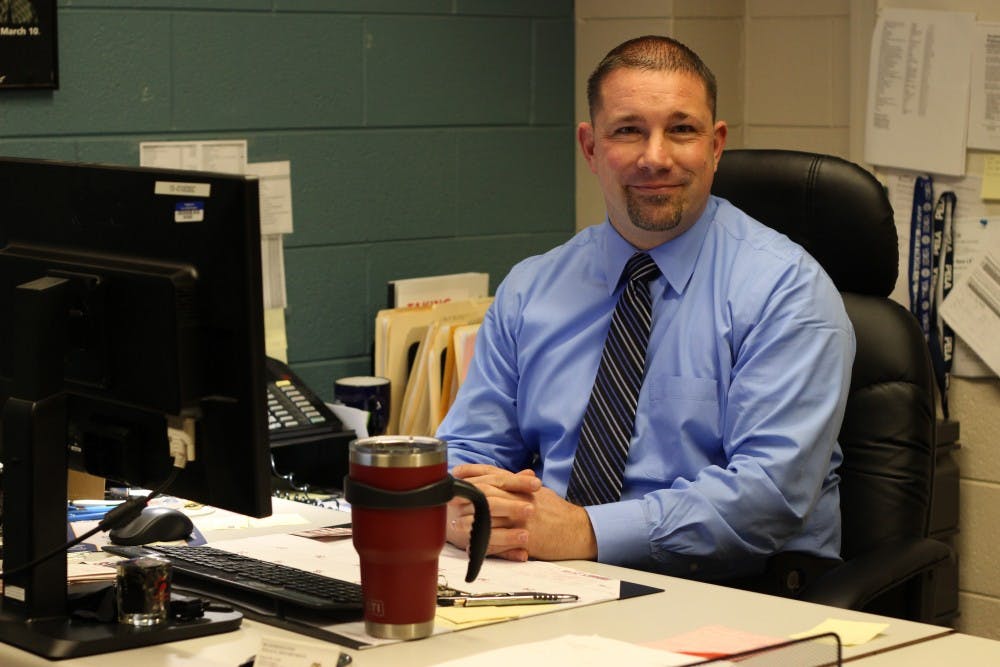A gay officer in a red state, Sgt. Dana Cole decided to wait a while before coming out to his colleagues at the Bloomington Police Department.
“Before anybody put a label on me, I wanted to show them who Dana Cole was,” he said.
Cole, a 14 year veteran at BPD, came from a religious background and studied as a criminal justice major at IU-South Bend before switching to business. He decided to change majors after some ride-alongs with police where he heard negative comments directed toward gay individuals.
Cole, who was not out at the time, said those experiences jaded his view of law enforcement.
After he graduated from IU-South Bend and found himself without any jobs lined up, Cole took a position he heard about through a friend with the Notre Dame Security Police.
He later took a full-time position at the Bremen Police Department, just south of South Bend, Indiana, where he said his fears about being gay in the police force were confirmed.
He remembers a particular officer at Notre Dame finding out he was gay and treating him disrespectfully, making comments about his sexuality.
“I’ve encountered this several times where individuals who you think are your friends find out and then they do a complete 360,” Cole said.
He said it was interesting how differently he was treated from his lesbian colleagues.
The same officer who treated him rudely was “buddy-buddy” with one of his lesbian colleagues at Notre Dame, he said.
Cole said a lot of male officers feel threatened by working with a gay officer in such a “macho” profession.
At that point, he knew he wanted to work in a larger city that would be more accepting of an LGBT officer. He applied to a few departments and ended up in Bloomington.
BPD has a dozen gay and lesbian officers that are out in the workplace, nearly 12 percent of its police force.
Cole said he hasn’t had any issues with discrimination at BPD, although he has heard “horror stories” of older, retired officers interacting with Bloomington’s LGBT community.
None of the individuals he’s gotten negative feedback about currently work at BPD.
Every year, the Human Rights Campaign calculates an equality index for major cities. In 2015, Bloomington would have received a perfect score, but only if the city had an LGBTQ liaison officer in its police department.
Cole said that year's index spurred him to consider creating the position.
In a promotional interview in 2016, Cole pitched the idea of adding an LGBTQ liaison position to BPD.
Capt. Steve Kellams approached Cole after the interview and told him he supported the idea, so Cole began planning. He recruited Sgt. David Alley as his co-liaison and created what he calls a three-pronged approach to the position.
The prongs include community outreach, training and recruitment.
Cole remembers hearing criticism from the community when the position was first announced.
This stuck with Cole. He said he wants his job to be more than a label, so he’s focused on making connections within the community.
He attempts to do this by attending events like Bloomington’s PRIDE Summerfest, speaking at diversity forums and talking about his position in School of Education classes.
Forging these kind of relationships, however, is not always easy. Cole met with Doug Bauder, director of IU’s LGBTQ+ Culture Center, for guidance last week.
“There’s going to be people in this community that just don’t like the police for whatever reason," Cole said, "And there’s probably nothing I can do to change their opinion."
Bauder said there are ways to fix this.
“When there are enough relationships of trust established, we get a lot of work done,” Bauder said. “Relationships of trust make all the difference.”
Cole said community engagement could be a full time position, but he has other responsibilities as a detective sergeant for BPD.
The liaison position’s second prong, training, applies not only to educating Bloomington, but also to teaching officers how to interact with the LGBT community respectfully.
Cole keeps an eye on police relations-related news and tries to help BPD learn from other departments nationwide. He is currently focusing on training officers on how to interact with transgender individuals appropriately.
“I’m preparing BPD for the day that we’re going to have our first transgender officer,” Cole said.
He has talked to several transgender individuals who are interested in law enforcement but are worried about entering the profession. Talking to LGBT individuals who are interested in joining the force is a piece of the recruitment prong for Cole.
Cole also said he thinks the IU Police Department would benefit from an LGBTQ liaison of their own.
Capt. Craig Munroe said IUPD has an officer interested in pursuing the position, and Cole is hopeful that it will be an upcoming addition.
Despite decades of tensions between the LGBT community and the police force dating back to the Stonewall riots, violent demonstrations by the gay community against a police raid in 1969, Bauder and Cole both said Bloomington could be an exception.
Bauder said it would go a long way for the Bloomington community to get to know Dana Cole.
“I’m not faulting people who had a bad experience with police,” Bauder said. “There’s a lot of reason to blame police departments, but I just like to think we here could be a model for good relationships.”



